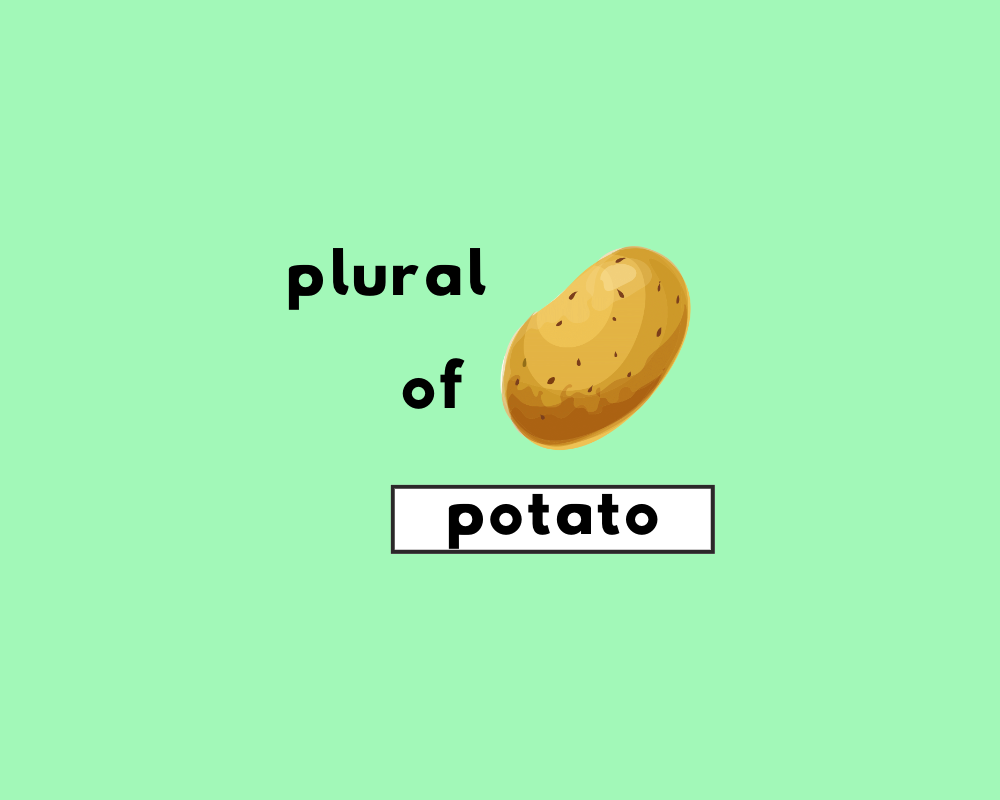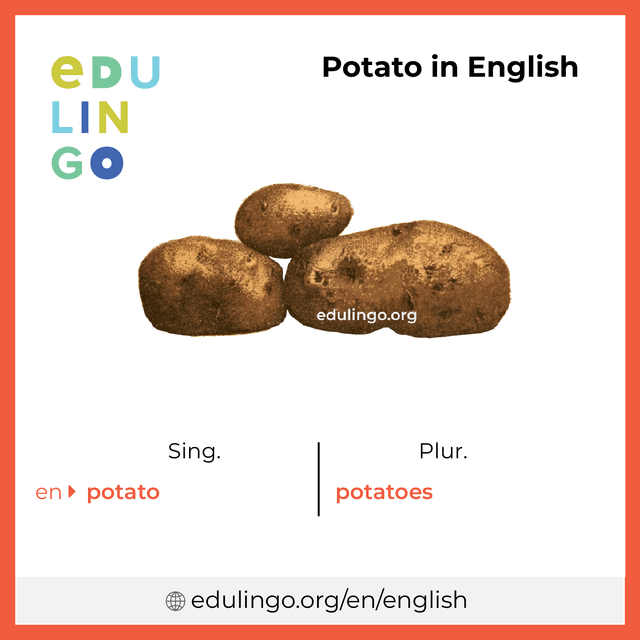Is the plural of "potato" simply "potato" with an added "s"? The answer, unequivocally, is no. The correct plural form is "potatoes," a detail crucial for clear and professional communication.
In the realm of the English language, the humble potato presents a deceptively simple linguistic challenge. While the rules for pluralizing nouns often seem straightforward typically involving the addition of an "s" exceptions abound, and the potato, as it turns out, is one such exception. This article will delve into the correct pluralization of this starchy staple, providing clarity and precision to your writing and speaking.
| Topic | Potato Pluralization |
| Singular Form | Potato |
| Plural Form | Potatoes |
| Rule Applied | Nouns ending in "o" typically add "es" to form the plural. |
| Exceptions | Certain words ending in "o" follow different pluralization rules (e.g., photo/photos, piano/pianos). |
| Common Misspellings | "Potatos" is a frequent misspelling and is incorrect. |
| Examples | I need one potato for the recipe. I need several potatoes for the stew. The farmer harvested many potatoes this season. |
| Related Terms | Couch potato, potato chip, Irish potato, white potato. |
| Origin | Solanum tuberosum, a plant native to South America, with edible starchy tubers. |
| Pronunciation | "Puh-tay-tohz" for the plural form. |
| Rule for American English | Standard rule. "Es" is added to the end of word. |
| Why "Potatoes" | This maintains pronunciation and spelling consistency. |
| Correct Usage | "Potatoes" are always used as the plural form. |
| Mnemonic Tip | Rhyme with "tomatoes" (another noun ending in 'o'). |
| Official Reference | Wikipedia: Potato |
The English language, while rich and expressive, can occasionally present hurdles for even the most seasoned speakers and writers. One such hurdle lies in the correct formation of plurals, particularly for nouns that deviate from the standard "add an 's'" rule. The word "potato" is a prime example of this, leading to frequent confusion and, consequently, misspellings. The correct plural form, as widely recognized and accepted, is "potatoes."
Read also:Breaking Police Arrests In Paris Lyon More Latest Updates
The basis for this seemingly simple rule lies in the ending of the word. Because "potato" concludes with the letter "o," the standard procedure is to add "es" to create the plural. This general guideline applies to numerous other nouns that end in "o," such as "tomatoes" and "heroes." This pattern helps to keep consistency in both the spelling and the pronunciation of the words. But even in the English language, there are exceptions. "Photo," for example, becomes "photos," and "piano" becomes "pianos." There is no easily identifiable formula that instantly tells you which nouns ending in "o" follow which rules. It's necessary to know, through learning and experience, which words necessitate "es" and which words follow the "s" convention.
The incorrect form, "potatos," is a common misspelling. This error can undermine clarity and diminish the professionalism of written communication. It's essential to remember that only the plural form of "potato" includes the "e" (potatoes), while the singular form remains "potato." Therefore, if you're writing a grocery list and need to buy more than one, the correct notation is "potatoes."
The origin of this usage is rooted in the history of the word and the natural evolution of the English language. The word "potato" itself, referring to the edible starchy tuber of the plant Solanum tuberosum, has its roots in the South American continent. The plant's cultivation and subsequent spread led to the adoption of the term into various languages, including English, and the formation of the plural followed established linguistic patterns.
The usage of "potato" and "potatoes" is straightforward. "Potato" is used when referring to a single tuber. "Potatoes," on the other hand, is used to refer to two or more. For instance, you would say, "I need one potato for dinner," but "We bought a bag of potatoes at the market." The use of the plural form extends to various contexts, from recipes and grocery lists to agricultural reports and general conversation. This also extends to common phrases, for instance, "couch potato," a term describing a person who spends a lot of time sitting and watching television, or "potato chip" (or "potato crisp" in the UK), a thin slice of potato that has been fried or baked. Understanding the correct plural form, "potatoes," is therefore necessary for understanding the language.
The correct use of the plural form of "potato" transcends mere grammatical correctness; it reflects attention to detail and a commitment to clear and professional communication. Whether you are writing an essay, preparing a business document, or composing a casual message, using "potatoes" instead of "potatos" will elevate your writing and improve the readability of the text. It underscores a commitment to precision and accuracy, qualities that are always respected in both academic and professional contexts.
For those who struggle to remember the correct plural form, several mnemonic devices can be helpful. One technique is to associate "potato" with other words that follow the same pluralization rule, such as "tomato" and "hero." All these words end in "o" and add "es" in the plural. This association can serve as a reminder of the correct spelling. Additionally, one can simply memorize the correct plural form, reinforcing it through repeated exposure and use. This type of repetition helps solidify the rule in one's mind, making it easier to recall and use the correct form in the future.
Read also:Jagmeet Singh Facts Bio News What You Need To Know
In conclusion, the singular form of the word is "potato", and its plural form is "potatoes". This grammatical point is essential for anyone seeking to communicate effectively in the English language. Choosing the correct form ensures accuracy, clarity, and professionalism in your writing and speaking. Whether it's in a recipe, a grocery list, or a formal document, using "potatoes" is the proper and universally accepted way to refer to more than one of these versatile and nutritious tubers. While English has its oddities, this one, thankfully, is straightforward, ensuring your meaning is clear. So, the next time you're reaching for a "potato" or needing several, remember that it is always and unequivocally "potatoes".
To improve your writing skills, there are many resources available, including quick and engaging lessons. These lessons can help improve grammar and vocabulary, providing an efficient way to master the fundamentals of the English language. Practice consistently, and you'll see improvement very fast.
The potato is a versatile ingredient in many cuisines worldwide. From mashed potatoes and french fries to potato chips and roasted potatoes, this root vegetable is a culinary staple. Therefore, the correct use of its plural form is essential for anyone who speaks or writes in English.
The next time you are writing, be sure to use the right form of the word. Remembering the rule is as simple as knowing that "potatoes" is the correct plural of "potato."
Here are a few examples of the correct usage of "potatoes" in sentences:
- "Roasted potatoes are a staple in many American households."
- "The farmer harvested 100 pounds of potatoes this season."
- "For the soup, I need three potatoes."
- "She peeled and diced the potatoes before cooking them."
- "The recipe called for a variety of vegetables, including potatoes."


